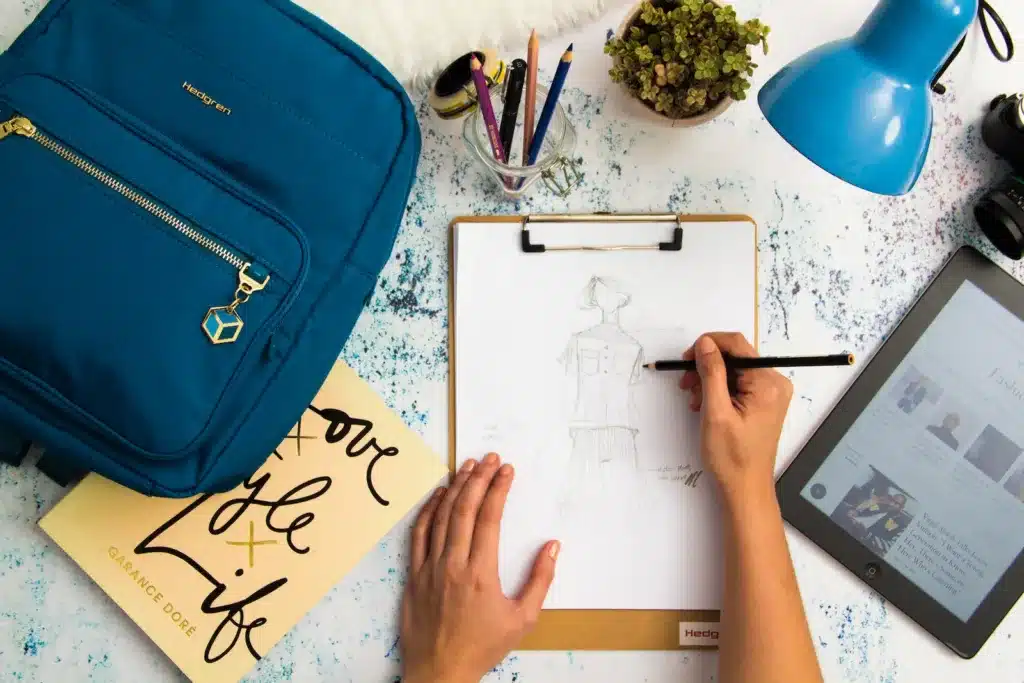Anxious? Take a deep breath. You’re not alone. Here are some mindfulness tricks to reduce anxiety, calm your mind, and cause stress relief.
Incorporate intention-setting, guided meditation, Metta meditation, doodling, coloring, walking, and more into your daily routine. These science-backed mindfulness exercises can provide quick and free anxiety relief.
Research shows the benefits of mindfulness for anxiety across diverse populations. Mindfulness strategies like focused breathing and muscle relaxation effectively calm anxiety by activating the body’s relaxation response.
Practicing mindfulness meditation techniques helps relieve stress and enhance mental health. Use these mindfulness tricks as part of your anxiety management toolkit. Discover which exercises resonate most to find ease and inner calm.
Set intentions, meditate, doodle – these practices can help you find calm. Incorporate them into your daily routine for greater well-being.
You’ll find relief from anxiety.
Table of Contents
ToggleKey Takeaways
- Setting an intention can help reduce anxiety and provide focus in challenging tasks.
- Engaging in guided meditation or mindfulness practices, such as using apps or online programs, can be effective in reducing depression.
- Doodling or coloring can stimulate creativity and provide relaxation and stress relief.
- Going for a walk outside and paying attention to the senses and environment can help reduce anxiety and enhance mindfulness.
- Wish others well and spread positivity. Practicing kindness improves your mental well-being.
- Focus on one thing at a time. Remove distractions and be fully present to lessen feeling overwhelmed.
- Take breaks from technology periodically. Unplugging improves focus, relationships, and self-care.
- Release emotions through journaling. Writing accesses your inner world and relieves stress.
14 Mindfulness Tricks to Reduce Anxiety
Anxiety affects millions, but small daily mindfulness habits offer relief. This article explores science-backed techniques to dial down anxiety and cultivate calm.
From intention-setting to forest bathing, discover 14 powerful yet accessible tricks.
With consistent practice, these activities create an oasis of tranquility amid chaos.
Reduce anxiety, enhance focus, and unlock the path to resilience. Come unpack your mindfulness toolkit – a sanctuary awaits anytime you need relief or resetting.
Utilize simple habits for lifelong benefits.
Being Intentional Helps Reduce Anxiety
Focus and remind yourself why you practice mindfulness by setting an intention. It gives direction and goals, reducing anxiety.
An intention provides direction and purpose when anxiety strikes. Before tasks, journal your motivation and goals. Refer back when overwhelmed.
Gain confidence and motivation in challenging tasks. Journal in the morning or before activities. Write down the purpose for the day or task. Refer back throughout the day.
Intentionally care for your body before the gym or be kind before eating. Cultivate a mindful mindset and boost practice.
Keep intentions clear, realistic, and positive. Revisit them as encouraging mantras when stressed. A moment of mindful intention sets the tone for tranquility.
Guided Meditation or Mindfulness Practice to Reduce Anxiety
Guided meditation directs your focus to ease anxiety. Following a soothing voice anchors you in the present, interrupting worry cycles.
Practices like loving-kindness meditation generate self-compassion to alleviate anxiety. Extend well-wishes to yourself and others.
Mindfulness goes beyond formal meditation. Doodle, walk mindfully, or color to immerse in the moment and find calm.
Explore apps and online programs that offer guided meditations. Benefits include less anxiety, better focus, and better well-being.
Consider your preferences and goals when choosing a program. Look for variety in meditation styles, durations, and topics. Read reviews and testimonials to judge its effectiveness.
Decide if you prefer voice-guided meditations or music/nature sounds. Experiment until you find one that resonates.
Tailor your preferred techniques – whether meditating or engaging in mindful activities. Consistency amplifies anxiety relief and emotional balance.
Make guided meditation a habit. Discover inner peace amidst life’s demands through this profound mindfulness practice. It can be a personal journey, so be patient and open-minded.
Doodle and Color for Stress Relief

Take an anxiety break and doodle or color. These creative outlets provide a sense of calm and accomplishment.
The benefits are numerous:
- Doodling refocuses your mind, reducing anxiety. It’s portable stress relief.
- Coloring is relaxing, unleashing your creativity. It offers a sense of control.
- Completing artwork provides a feeling of achievement.
- It’s an easy, enjoyable activity anyone can do.
Coloring books or blank pages let you express yourself. Doodle shapes or landscapes. The possibilities are endless.
Integrate doodling and coloring into your routine for effective, accessible stress management through creativity and self-expression.
Walk Mindfully to Reduce Anxiety
Embrace mindful walking to soothe anxiety. Focus fully on your sensory experience, from the rhythm of steps to sounds around you.
Take a stroll – outdoors. Notice the sights and sounds. Walking is great for the body and soul. Studies show it helps with stress.
Here’s how to make it work better: Focus on your breath. Take slow, deep breaths. Notice the physical feelings. Listen to the environment. Leave the phone off, to be more in tune with nature.
Set an intention to give your walk purpose, whether appreciating nature or seeking clarity. Shift focus to the present moment instead of worries.
A short walk is a powerful way to reduce anxiety and improve mental health.
Outdoor mindful walks let you immerse in nature’s therapeutic benefits. Looking up at the sky and trees elicits wonder, easing anxious thoughts.
Reflect during contemplative walking. Synchronize steps with deep breaths to invite calm.
Discover tranquility in each step. Let mindful movement transport you on a journey of serenity and self-discovery.
Looking up at the Stars Can Reduce Anxiety
Gaze up at the stars and feel your breath deepen. A calmness and fresh perspective will come over you.
Stargazing is not only beautiful, but it is also a good nighttime mindfulness activity. It reminds you that life is more than your worries and emails.
It gives you peace and helps you relax, reducing stress and connecting you to the moment.
Incorporating stargazing into your nighttime routine brings peace and helps you relax before sleep. So, take a few moments each night to look at the stars and enjoy the tranquility they bring.
Wish Others Happiness to Reduce Anxiety
Wishing happiness and comfort to others is a mindful act of kindness that uplifts both you and them. This compassionate practice connects us through shared humanity.
Pair well-wishing with mindfulness to amplify sincerity and oneness. Weave this into everyday interactions to spread positivity.
Extending loving-kindness meditation progressively to self, loved ones, and even challenging people, builds empathy.
The energy of well-wishes creates a harmonious, easeful environment. Boosting compassion enhances your own emotional resilience to anxiety.
Spread cheer by silently wishing others joy. This kind gesture can make a big difference:
- Positivity replaces negativity and cultivates optimism.
- Compassion grows, see beyond frustrations.
- Positivity ripples, and uplift those around you.
- Let go of anger, and foster forgiveness.
Practicing kindness and wishing joy can bring great fulfillment.
Make a habit of mindfully wishing others well. This act of kindness fosters inner calm and belonging. Spread this light to transform each moment.
Focus on One Thing at a Time to Reduce Anxiety
Take a deep breath and focus on one thing.
Be present and devoted to that task. Mindful eating is a great way to reduce stress and improve your relationship with food. Use sensory techniques to make eating more enjoyable and to connect with your body and food.
Here are five tips:
- Slowly savor each bite, noticing the flavor, texture, and smell.
- Notice the colors, shapes, and sounds.
- Take time to chew food and appreciate the nourishment.
- Express gratitude for the food and effort put in.
- Listen to your body’s hunger and fullness cues.
Leave the Phone Behind
Breaking your constant attachment to your phone provides space for mindfulness. When you leave your device behind, you detach from the endless stream of alerts that fuel anxiety.
Silence emerges, allowing you to connect with your surroundings and thoughts.
Taking time away from screens can improve presence and self-care. A digital detox can help reduce phone use and enhance well-being.
Without your phone, you actively observe the present instead of life through a screen.
Engage your senses fully—feel the environment’s textures, and hear its sounds. Interact meaningfully, free of distractions. You become an immersed participant, not just an observer.
Being alone without your phone nurtures self-reflection and care. Escape the comparison trap of curated social media lives. Shift your focus to self-acceptance.
Leaving your phone cultivates presence. You can fully engage in each moment instead of worrying about missing out. Digital detoxes, even in short bursts, help reduce anxiety and calm your mind.
By intentionally disconnecting, you create opportunities for awareness, real-world connections, and self-care. Savor the richness of the present when you leave your phone behind.
Brew Tea or Coffee Mindfully to Find Calm

Transform making your daily brew into a mindfulness practice. Brew tea or coffee to relax. Focus on each step. Watch the water and feel the warmth of the cup.
Approach the ritual with the intention of fully engaging your senses.
Mindfully select ingredients, appreciating the aromas, textures, and colors. Bring awareness to each step as you prepare your beverage.
Pause and simply breathe once the tea or coffee is ready. Savor the aroma before taking a mindful sip.
This mindful brewing ritual offers a tranquil escape from anxiety. The process ushers you into the present moment and quiet mind.
Make time for this soothing self-care respite. Let the ritual become an anchor to return to any time overwhelm rises. Find sanctuary in a steaming mindful cup.
Being mindful helps bring peace. Next time, enjoy the experience fully.
Turn Household Tasks Into a Mental Break
Turn household tasks into a mental break by making cleaning calmer and more mindful. Use easy words, an active tone, and lists.
- Mindful cleaning: Focus on each movement and sensation. Notice the fabric, water, and smells. Relax and stay present.
- Mindful cooking: Enjoy the colors, textures, and aromas. Take time to chop, stir, and savor. Find mindfulness and pleasure.
- Engage your senses: Notice the warmth of the water, the sound of the vacuum, and the feeling of the air. Focus and find relaxation.
- Practice gratitude: Appreciate the effort it takes to make a comfortable home. Shift to a positive mindset and reduce anxiety.
Turn chores into moments of relaxation. Be present and fully engage. Find peace and serenity.
Intentional Journaling Helps You Find Inner Peace
Pen and paper time! Journaling is great for relieving stress, bringing clarity, and helping out with emotions. It can help you release bad feelings, remember good things, and be more grateful.
Journaling is a simple yet powerful mindfulness practice. Keeping a daily journal provides many benefits:
- Stress relief and emotional clarity
- Processing feelings and thoughts
- Cultivating gratitude
- Boosting self-reflection
Use techniques like free-writing, gratitude lists, or drawing to tap into journaling’s benefits. Release negative emotions, and focus on the good.
Take a few minutes every day for journaling. This intentional ritual builds mindfulness, reduces anxiety, and promotes positivity. Make journaling a regular habit and feel its transformative effects.
Pausing at Stoplights
Use stoplights as reminders to find mindfulness amidst your rush. As you pause, breathe deeply and anchor into the present moment.
Engage your senses fully. Observe details around you and express gratitude for the oasis of calm. Try muscle relaxation as well. Start from your toes and work up your body, tensing and loosening each part.
Doing this at stoplights can help you stay centered throughout the day.
Reflect inwardly without judgment. Create mental spaciousness to find tranquility during the pause.
Carry this mindful presence with you as you drive. Stoplights become opportunities to center yourself and dial down anxiety.
By infusing mindfulness into ordinary moments, you transform routine into revitalizing self-care.
Let brief pauses nourish awareness, enhancing your ability to stay focused and serene.
Log Out of Social Media Accounts
Log off socials and make time for yourself.
Strategies for cutting down and perks of leaving social media:
- Productivity: Logging out can help you stay focused and get more done.
- Mental health: Taking a break can help ease stress and make you happier.
- Relationships: Being off socials lets you give full attention to people around you.
Make changes and benefit from less time on social.
Prioritize self-care and presence.
Taking Breaks and Doing Nothing
Take it easy. Give yourself a break. Just sit back and let your mind wander.
Taking breaks and doing nothing may sound strange, but it’s an effective way to reduce stress. Mindful daydreaming and stillness are great for your mind and body.
Unplug from the hustle and bustle and make time for yourself. Let your thoughts flow without judgment or pressure. Doing nothing helps your mind and body rest and recharge, giving you more clarity and less stress.
Conclusion
Incorporate these simple yet powerful techniques into your daily life to reduce anxiety and cultivate calm.
Setting an intention can provide clarity and direction to help you stay focused. Guided meditation apps make the practice easily accessible anytime you need relaxation.
Creative activities like doodling and coloring offer stress relief through self-expression.
Spending time in nature, and walking mindfully without devices brings us into the present moment. Extending good wishes to others spreads more positivity out into the world.
Take moments throughout the day to pause, breathe deeply, and recenter yourself.
Unplug from technology periodically for a digital detox. Take breaks, pause at stoplights, and log out of social media.
Prioritize self-care through journaling, enjoying a hot drink, or doing nothing at all. Shift your mindset to find peace in simple household tasks.
Use breathing, progressive muscle relaxation, and mindfulness meditation.
With regular practice of these mindful habits, you’ll find relief from anxiety and greater contentment overall. Discover what works best for you and build your own toolkit of techniques to find calm each day.
Frequently Asked Questions
How Can Setting an Intention Help Reduce Anxiety?
Setting an intention can reduce anxiety by providing focus and purpose to your actions. It helps you stay grounded and reminds you why you’re doing something, which can alleviate feelings of uncertainty and overwhelm.
Additionally, practicing guided meditation through apps or online programs can be beneficial for reducing anxiety. It allows you to dip into the practice without committing to expensive classes, and there are countless free guided meditations available online.
Are There Any Specific Apps or Online Programs Recommended for Guided Meditation to Help Reduce Anxiety?
There are several guided meditation apps and online programs that can be helpful in reducing anxiety. These resources provide easy access to guided meditations without the need for expensive classes.
Countless free guided meditations are available online, allowing you to dip into the practice whenever you need it.
Some popular guided meditation apps include Headspace, Calm, and Insight Timer. These apps offer a variety of meditation practices and can be effective tools for reducing anxiety and promoting mindfulness.
Can Doodling or Coloring Be Used as a Form of Therapy to Reduce Anxiety?
Doodling or coloring can definitely be used as a form of therapy for mindfulness exercises. Engaging in art therapy has been shown to have numerous benefits for reducing anxiety and promoting relaxation.
The act of doodling or coloring stimulates creativity and gives your mind a break from stress and worry. It provides a sense of accomplishment and can be a calming and mindful activity.
So go ahead, grab some colored pencils or markers, and let your creativity flow for some much-needed stress relief.
What Are Some Specific Benefits of Going for a Walk in Nature?
Going for a walk in nature has numerous benefits for reducing anxiety. It allows you to connect with the natural world, which can have a calming effect on your mind and body.
You can focus on the beauty around you and pay attention to your senses, which helps keep you in the present moment. Leaving your phone behind enhances the experience, allowing you to fully immerse yourself in nature.
How Can Wishing Happiness to Others Positively Impact Your Mental Well-Being and Reduce Anxiety?
Wishing happiness to others can have a positive impact on your mental well-being.
When you extend kindness and positive energy to others, it creates a ripple effect that can uplift your own mood. It reminds you to focus on the well-being of others and shifts your perspective away from your worries.
Practicing random acts of wishing happiness, even when you’re annoyed or upset with someone, can help cultivate compassion and improve your overall mental well-being.









